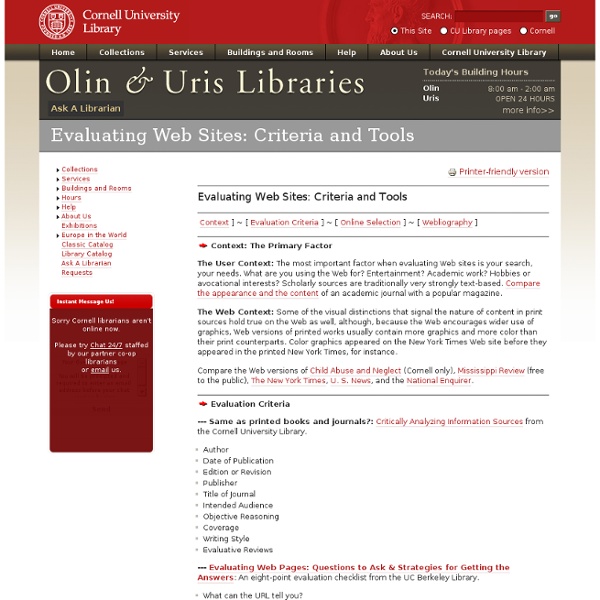Welcome to the Web
Thank you for visiting 'Welcome to the Web'. By working your way through this web site and taking part in the exciting challenges and activities, you will learn all about the Internet. Good luck! Choose a section to begin.
Checklist for Evaluating Web Resources
Is the Web a good research tool? This question is dependent on the researcher's objective. As in traditional print resources one must use a method of critical analysis to determine its value. Here is a checklist for evaluating web resources to help in that determination. Authority: Is the information reliable?
Evaluating Web Pages: Techniques to Apply & Questions to Ask
1. What can the URL tell you? Techniques for Web Evaluation : 1.
Database - What Is A Library Database? - Enoch Pratt Free Library
What is a library database? Library databases contain information from published works.Examples: Magazine and newspaper articles,encyclopedias and other reference books.Library databases are searchable.By Keywords, Subject, Author, Magazine Title, Date, etc.Library databases provide citation information.Author, if availableTitle of ArticlePublication (Title of Magazine, Newspaper, or Reference Book)PublisherDate of PublicationLibrary databases often contain full-text articles.You can print or email an entire article.There are different kinds of library databasesFor specific topics. Examples: Biography Resource Center , New Book of Popular ScienceFor general topics Examples: ProQuest, World Book OnlineLibrary databases are paid for by taxpayer dollars. How is a library database different from a website?
Archived: Effects of Technology on Classrooms and Students
A r c h i v e d I n f o r m a t i o n Change inStudent andTeacherRoles When students are using technology as a tool or a support for communicating with others, they are in an active role rather than the passive role of recipient of information transmitted by a teacher, textbook, or broadcast. The student is actively making choices about how to generate, obtain, manipulate, or display information.
Operators and more search help - Web Search Help
You can use symbols or words in your search to make your search results more precise. Google Search usually ignores punctuation that isn’t part of a search operator. Don’t put spaces between the symbol or word and your search term.
Using Technology In The Classroom
Technology has always been a major focus on EducationWorld.com. This archive compiles many of the features we have done on the subject of using technology in the classroom. Many of these articles have been updated many times or even rewritten as technology changes.
Advanced Search - Web Search Help
Narrow down search results for complex searches by using the Advanced Search page. For example, you can find sites updated in the last 24 hours or images that are in black and white. Do an Advanced Search Tip: You can also use many of these filters in the search box with search operators.
The 5 Elements Students Should Look For When Evaluating Web Content
March , 2014 In a section in her wonderful book "Understanding The Social Lives of Networked Teens" Danah Boyd talked extensively about the concept of digital natives and argued that this nomenclature does not really capture the essence of what a digitally savvy teenager really means. Dana argued that the mere fact of being comfortable with a social media tool does not prove that the user has a digital fluency to allow them to better use it for educational purposes : Just because teens are comfortable using social media to hang out does not mean that they’re fluent in or with technology.
An overview of Google Docs - Google Docs Help
What are Google Docs, Sheets, and Slides? Google Docs, Sheets, and Slides are productivity apps that let you create different kinds of online documents, work on them in real time with other people, and store them in your Google Drive online — all for free. You can access the documents, spreadsheets, and presentations you create from any computer, anywhere in the world. (There's even some work you can do without an Internet connection!) This guide will give you a quick overview of the many things that you can do with Google Docs, Sheets, and Slides.



